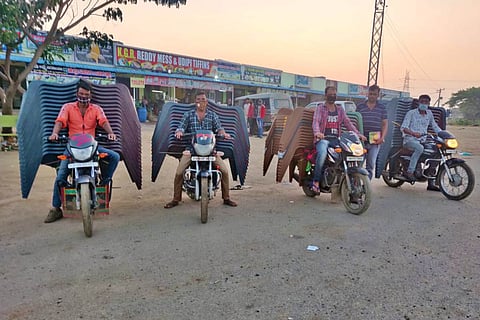

“I think it’s too much to expect people to buy chairs or any kind of furniture for their houses at this point, but we’re hoping there will be a shift in this passive market,” says Parasanul, a 35-year-old migrant labourer who decided not to travel from Telangana to his hometown of Niwari in Madhya Pradesh (MP) during the lockdown.
Unlike thousands of migrant labourers who chose to go back to their home states by any means of transport or even by foot, Parasunul and 10 of his friends, who work as commission based street hawkers for a company that manufactures plastic chairs, decided to stay back.
Until mid-March things were going well for Parasunul, who had left behind his wife and two young children back home in MP. This specific group of labourers was selling chairs in Nirmal, Nizamabad and Kamareddy districts, and would change their location every 15 days. These street hawkers, like any other migrants who come from different states, are landless agricultural labourers or small-scale farmers who are forced to move out in search of a livelihood. TNM met them near Banswada X road in Kamareddy district.
According to Amar Singh (30), who hails from a village in Ashoknagar in MP, going back was not a desirable option as the wages were better in Telangana. Back home, he used to work as an agricultural labourer for Rs 150 per day. “We can go back home, but what do we do there? There’s no work and even if we get something they will pay very less. We thought things would get back to normal but it didn’t,” he says.
Amar Singh and his friend Gopal make rotis and cook meals for all, while others engage in chores like cleaning utensils. On the days they cannot cook, the men pool in money and buy food from roadside eateries.
B Laxman (28), who is from Anagidi of Mansur in MP, suffered a lot during the lockdown because there was no work or income. He says, “We’d spent whatever we saved to buy ration. As we couldn’t sell any chairs, there was no more money and we had to get it from our families, who would take loans and send it to us.”
These chair sellers stay in groups and work for contractors of different companies. While the contractor pays for accommodation and fuel, the labourers have to take care of the food.
Laxman says that their business hit rock bottom as the pandemic had affected the sales since there was little or no income for many in the rural areas during the lockdown. “How will they buy chairs or any item for household use when they find it difficult to even run the house? Yet we try our luck every day, selling 10-15 chairs a day has become a big deal now.”
Selling one chair fetches them Rs 20-30, which means 10 chairs a day would bring around Rs 200. Earlier it used to be Rs 700-800 per day after six to eight hours of hawking around villages. Laxman further adds, “This Rs 200 is just enough for our food. I think it’ll take some more time for things to be stable again.”
Pathetic living conditions
Every morning before dawn, the workers load the chairs onto their bikes and head to the villages to sell them. All of them wear masks and carry hand sanitisers. Gopal, the youngest among them, says, “Earlier, people used to give us food. Now they’re scared to even give us water, so we carry water bottles to avoid risk.”
For the last 10 days, the men have been staying in a tiny room in the cellar of a shopping complex without a bathroom facility, and that’s where TNM visited them. While three people can sleep in the room amid the bundles of chairs, the others sleep on the stairs of the complex along the highway where they are assailed by mosquitoes.
When asked how they are keeping up, Saithan Singh, 30, says, “At this point of time, we’re happy that we’re able to get food every day with our small earnings. If we look for comfortable accommodation, it’ll be difficult to feed ourselves.”
The labourers feel that they have taken a good decision by not going home during the lockdown as they believe conditions are much worse back home and they hope things here will get better. Many are of the opinion that things would not be so pessimistic once the monsoon crops are harvested.
Dr Siliveru Harinath, Senior Research Fellow at the Centre for Economic and Social Studies (CESS), observes that the situation is a result of the pandemic driven lockdown. He says, “At this point of time, people’s economic resources have dried up due to which all dependent informal economies are affected. By November-December there might be a slight improvement in the rural areas as paddy and other short-term crops will be ready for reaping and that might generate some money and change the market.”
He adds, “The pandemic has created additional burdens. People would rather focus on things like buying smartphones for children for online classes.”